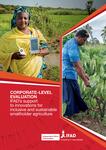Page Header
IFAD's financial architecture
Overview
The overarching purpose of the corporate-level evaluation on IFAD's financial architecture is to independently assess how IFAD creates value for Member States through sound investment decisions and financial strategies contributing to rural poverty reduction. This is the first evaluation of its kind undertaken by a development finance institution and one of the most complex evaluation exercises conducted by the Independent Office of Evaluation (IOE). It examines the policies and systems adopted to mobilize, manage, allocate and disburse financial resources to fulfil IFAD's mandate. The evaluation generated a number of important findings and recommendations that merit close attention. The main finding is that the Fund's financial architecture has been under strain since the Ninth Replenishment period of IFAD's financial resources. As it stands, it can no longer support an expanding programme of loans and grants. Moreover, the financial architecture does not pass the test of financial sustainability: accumulating losses lead to an erosion of IFAD's equity. Therefore, the evaluation recommends that important reforms be undertaken to address the factors affecting IFAD's financial sustainability, the mobilization of financial resources and the rationale by which these are allocated. It also recommends introducing new and revising current financial products to respond to the demands of borrowing Member States, as well as to internal and external financial governance. Accomplishing these reforms will be essential to ensure the Fund's financial sustainability, enabling IFAD to fulfil its unique mandate of rural poverty reduction and make a substantial contribution towards meeting the goals set in the Agenda 2030.Report Details
| Year Published | |
| Type | |
| Joint | No |
| Partner/s | N/A |
| Consultant name | |
| Agency Focal Point | Fabrizio Felloni |
| Focal Point Email | f.felloni@ifad.org |
| Managed by Independent Evaluation Office | Yes |
YOU 'RE READING
IFAD's financial architecture







